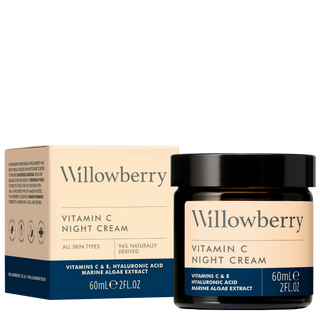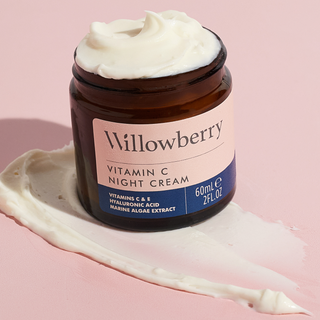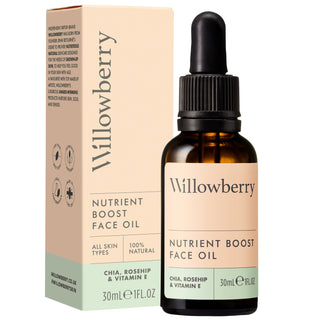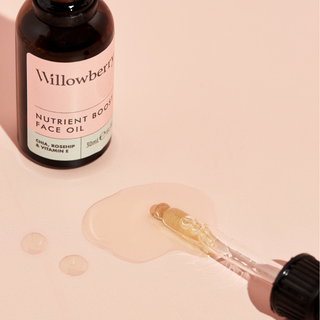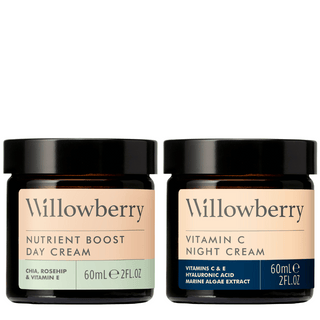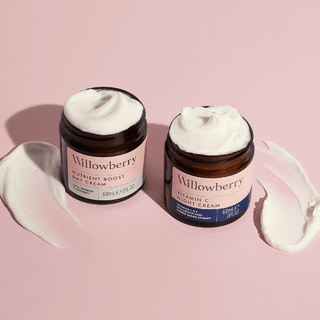For most, a change of season means different clothes, a change of outdoor habits and new dietary preferences. But for rosacea sufferers it's a fresh batch of triggers. The chronic skin condition affects 415 million people worldwide and while the symptoms can differ from person to person, the general symptoms are redness of the face, skin sensitivity, a hot sensation and an uneven skintone. But for more extreme cases, face swelling, visible blood vessels and an enlargement of the nose can all be typical occurrences.
For many, rosacea triggers can be very personalised and unique. And while skincare ingredients such as green tea, niacinamide and feverfew can calm the skin, building a strong barrier is key to provide more protection to diluted blood vessels and ultimately, disguise any redness. Our Willowberry Sensitive Face Oil is packed with rosehip, chia seed and vitamin E, high in vitamins, antioxidants and essential fatty acids, to help protect skin's barrier function while being extremely gentle on the skin, making it ideal for rosacea sufferers. But the wider solution to rosacea is understanding what triggers to avoid.
-
Stress
Your heart rate is rapid, you can feel the heat rising and before you know it, you're in the middle of a rosacea episode. In a recent study from the National Rosacea Society, 79% of rosacea patients named emotional stress as one of the top causes of a flare-up of facial flushing. When we feel stressed or anxious our brains release various stress hormones, including corticotropin-releasing hormone (CRH), glucocorticoids, and epinephrine, triggering a wide range of responses throughout our bodies, including our skin. CRH, for example, impedes the regeneration of new cells called keratinocytes within the skin, as well as stimulating various inflammatory pathways leading to an aggravated complexion.
By practising slow breathing techniques, slowing the heart rate and getting enough sleep, you can help reverse the effects stress has on your rosacea.
-
Heat
Sitting next to a cosy fire may be the stuff of Pinterest boards but it can be a big no-no for rosacea sufferers. With a thin and sensitive dermis, the skin feels temperature changes quickly and severely as blood vessels dilate, giving a flushed appearance. Likewise, when going from hot to cold or vice versa, this can also have a similar effect, making seasonal changes difficult to navigate.
Protect your skin with a nourishing face oil, hydrating moisturiser and SPF to protect your visage from the elements and try to stagger temperature changes as much as possible.
-
Alcohol
While we're not suggesting you go teetotal (unless you want to), understanding your tipple of choice could be key to avoiding a rosacea flare-up. A study by the National Rosacea Society found that red wine caused rosacea flare-ups for 76% of people, while white wine aggravated the condition in 56% and champagne affected 33% due to the tannins used.
By opting for a non-alcoholic alternative or spirit-based beverage in moderation, you can avoid the hot, blotchy skin associated with rosacea.
-
Diet
For many experts, the link between diet and rosacea is strong. It's thought that rosacea can be triggered by an imbalance in the microorganisms that live in our gut and on our skin. Promote good bacteria in the body with a fibre-, prebiotic- and probiotic-rich diet such as yoghurt, sauerkraut, miso and kefir whilst avoiding spicy foods that contain capsaicin, which gives these foods their heat.
-
Pollution
Bad news for city dwellers - air pollutants such as polycyclic aromatic hydrocarbons (PAH), volatile organic compounds (VOC), oxides, ozone and cigarette smoke have been known to exasperate rosacea symptoms. This is because they can damage our skin's natural oils, leading to water loss and a vulnerable barrier. This leaves the skin open to free radical damage, pigmentation and sensitive to the inflammatory condition. Try to avoid high polluted areas, opt for anti-inflammatory skincare and make sure you include a high SPF in your skincare routine to protect your skin from the elements.
Article by Jessica Harris
Willowberry is 'Nutritious Natural' skincare for grown-ups for your best skin. Launched in 2017, Willowberry is an award-winning independent British brand that has gained a cult following. Loved by top make-up artists, the streamlined, highly effective range protects skin’s natural barrier function to nourish and transform grown-up skin, with indulgent formulas that feed the skin and soul.




